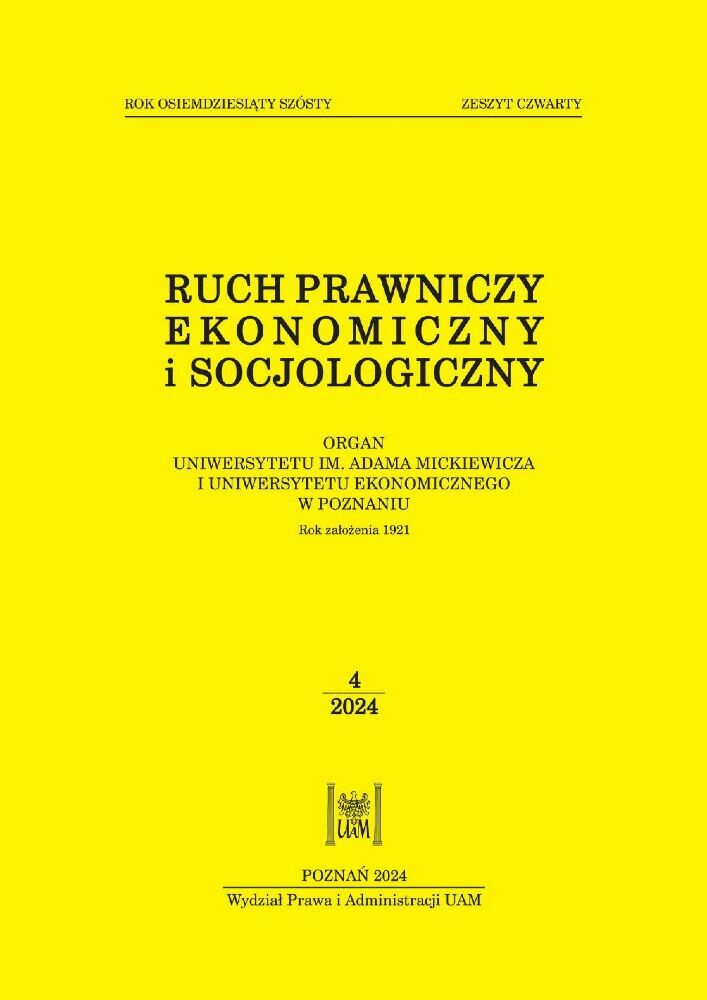Abstract
The basic pillars of restorative justice include the victim’s right to compensation and the perpetra-tor’s obligation to repair the damage caused, which should aim at making the perpetrator aware of their guilt and understanding the consequences of the crime. A practical dimension of applying restorative justice may therefore be financial restitution for the aggrieved party. In the Polish legal system, the legislator defined the provision of Article 244c of the Penal Code, which entered into force on 1 October 2023, as one of the manifestations of restorative justice. The study aims to assess the new regulation in the Polish legal system regarding the crime of evading the execu-tion of a compensatory measure ordered by the court as an instrument to support the aggrieved party in obtaining compensation. To this end, the authors identify the reasons for introducing the discussed standard and analyse it. The article uses dogmatic and comparative law methods. The most important conclusion from the analysis is the fact that the adopted solution improves the actual situation of the aggrieved party, who has received an important instrument to persuade the perpetrator to fulfil their obligation when they evade the execution of a compensatory or exemplary measure ordered by the court. The article also includes de lege lata observations and de lege ferenda postulates related to the regulation of Article 244c of the Penal Code and presents an evaluation of this regulation in the context of the legal orders of selected European countries.
References
Ashley, J., i Stevenson, P. (2006). Implementing balanced and restorative justice: A guide for law enforcement. Illinois Criminal Justice Information Authority. Pobrane 28 listopada 2024, z: https://www.ojp.gov/ncjrs/virtual-library/abstracts/implementing-balanced-and-restorative-justice-guide-law-enforcement
Bogacki, P., i Olężałęk, M. (2023). Kodeks karny. Komentarz do nowelizacji z 7.7.2022 r. C. H. Beck.
Bróżek, P. (2021). Problem „uchylania się” od naprawienia wyrządzonej szkody lub krzywdy przez sprawcę przestępstwa. Monitor Prawniczy, 22, 1187–1193.
Brüning, J. (2015). Die Einstellung nach § 153a StPO. Moderner Ablasshandel oder Rettungsanker der Justiz? Zeitschrift für Internationale Strafrechtsdogmatik, 12, 586–592. https://zis-online.com/dat/artikel/2015_12_969.pdf DOI: https://doi.org/10.5771/9783845265384-125
Christie, N. (1977). Conflicts as property. The British Journal of Criminology, 1, 1–15. DOI: https://doi.org/10.1093/oxfordjournals.bjc.a046783
Gladfelter, A. S., i Ruback, R. B. (2017). Victims’ needs and restorative justice. W: C. Roberson (red.), Routledge handbook on victims’ issues in criminal justice (s. 196–202). Routledge. DOI: https://doi.org/10.4324/9781315644967-19
Hamman, A. J., i Nortje, W. (2017). Compensation orders in criminal proceedings – a fresh perspective. Litnet Akdemesies. University of the Western Cape Research Repository. Pobrane 28 listopada 2024, z: https://uwcscholar.uwc.ac.za:8443/server/api/core/bitstreams/539421f8-2f50-4304-8c79-5d237df36555/content
Herzog, A. (2023). Komentarz do art. 244c. W: R. A. Stefański (red.), Kodeks karny. Komentarz (s. 1717). C. H. Beck.
Kowalewska-Borys, E., i Kużelewski, D. (2010). Postępowanie adhezyjne w polskim i niemieckim procesie karnym – zarys problematyki na tle prawnoporównawczym. W: Z. Ćwiąkalski i G. Artymiak (red.), Karnomaterialne i procesowe aspekty naprawienia szkody (s. 442–456). Wolters Kluwer Polska.
Lauwaert, K. (2015). Restorative justice and restorative justice practices. W: K. Lauwaert i I. Aertsen (red.), Desistance and restorative justice: Mechanisms for desisting from crime within restorative justice practices (s. 38–53). European Forum for Restorative Justice.
Liu, D., i Schiemann, A. (2018). Staatliche Opferentschädigung und Adhäsionsverfahren Reformbedarf in Deutschland und China. Kriminalpolitische Zeitschrift, 3, 162–171. https://kripoz.de/wp-content/uploads/2018/05/liu-schiemann-staatliche-opferentschaedigung-und-adhaesionsverfahren.pdf
Łazarz, M. (2021). Odpowiedzialność karna za uchylanie się od wykonania środka kompensacyjnego. Biuletyn Stowarzyszenia Absolwentów i Przyjaciół Wydziału Prawa Katolickiego Uniwersytetu Lubelskiego, 18(1), 165–183. DOI: https://doi.org/10.32084/sawp.2021.16.1-10
Łukawska-Malicka, M. (2022). Czym jest sprawiedliwość naprawcza? Istota i zarys problematyki. Annales Universitatis Mariae Curie-Skłodowska Lublin-Polonia, 2, 43–59. https://journals.umcs.pl/g/article/view/14299
Mozgawa, M. (2023). Komentarz do art. 244c. W: M. Mozgawa (red.), Kodeks karny. Komentarz (s. 977–978). Wolters Kluwer Polska.
Piehler, F., i Weiß, J. (2021). Das Verhältnis zwischen strafrechtlicher Bewährungsauflage und zivilrechtlichem Schadensersatzanspruch. Juristische Rundschau, 12, 616–623. DOI: https://doi.org/10.1515/juru-2021-0007
Pilarczyk, Ł. (2018). Obowiązek naprawienia szkody w prawie karnym. Wydawnictwo Naukowe UAM.
Pilarczyk, Ł. (2023). Przestępstwo uchylania się od wykonania środka kompensacyjnego (art. 244c Kodeksu karnego) – ocena zasadności wprowadzenia regulacji. Prawo w Działaniu, 55, 182–203. DOI: https://doi.org/10.32041/pwd.5509
Pin, X. (2006). Les victimes d’infractions définitions et enjeux. Archives de politique criminelle, 28(1), 49–72. DOI: https://doi.org/10.3917/apc.028.0049
Pranis, K. (1998). Guide for implementing the balanced and restorative justice model. U.S. Department of Justice. Pobrane 28 listopada 2024, z: https://ojjdp.ojp.gov/library/publications/guide-implementing-balanced-and-restorative-justice-model
Przesławski, T. (2017). Organizacja wykonania kary pozbawienia wolności a idea sprawiedliwości naprawczej. Przegląd Więziennictwa Polskiego, 94(1), 35–50. https://open.icm.edu.pl/handle/123456789/20122
Roberts, J. V., i Manikis, M. (2011). Victim personal statements: A review of empirical research. Office of the Commissioner for Victims and Witnesses of England and Wales. DOI: https://doi.org/10.2139/ssrn.3032138
Silecka-Marek, E. (2021). Miejsce sprawiedliwości naprawczej w polskim systemie karnym. Konińskie Studia Społeczno-Ekonomiczne, 7(1), 69–84.
Taylor, L. (2014). The English and Welsh perspective on legal aid for crime victims. W: P. Wiliński i P. Karlik (red.), Improving protection of victims’ rights: Access to legal aid (s. 183–190). Adam Mickiewicz University, Faculty of Law and Administration.
Wiak, K. (2024). Komentarz do art. 244c. W: A. Grześkowiak i K. Wiak (red.), Kodek karny. Komentarz (nb. 2 oraz 7). Legalis.
Zalewski, W. (2006). Sprawiedliwość naprawcza. Początek ewolucji polskiego prawa karnego? Arche.
Zawiejski, P. (2016). Idea sprawiedliwości naprawczej. W: T. Dukiet-Nagórska (red.), Idea sprawiedliwości naprawczej a zasady kontynentalnego prawa karnego (s. 11–24). Uniwersytet Śląski; Wydawnictwo Poltext.
Zgoliński, I. (2023). Komentarz do art. 244c. W: V. Konarska-Wrzosek (red.), Kodeks karny. Komentarz (s. 1261–1263). Wolters Kluwer Polska.
License
Copyright (c) 2024 WPiA UAM

This work is licensed under a Creative Commons Attribution 4.0 International License.





